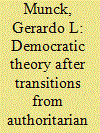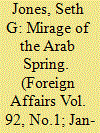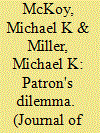| Srl | Item |
| 1 |
ID:
105252


|
|
|
|
|
| Publication |
2011.
|
| Summary/Abstract |
Recent events across the globe make clear the complexities of the politics of "democratization" and the importance of developing nuanced and compelling understandings of these complexities. In Eurasia, "Color Revolutions" have given way to democratic disappointments and "authoritarian regimes." In north Africa, an unanticipated upsurge of democratic movements has felled autocrats in Tunisia and Egypt, but the political outcomes of these "transitions" are very much in doubt. Contemporary political science has developed an elaborate vocabulary for understanding such processes. And this vocabulary owes a great deal to a small group of scholars-Juan Linz, Guillermo O'Donnell, Philippe Schmitter, Alfred Stepan and Adam Przeworksi-who helped to lay the theoretical foundations of our current understanding of politics around the globe.
|
|
|
|
|
|
|
|
|
|
|
|
|
|
|
|
| 2 |
ID:
116107


|
|
|
|
|
| Publication |
2013.
|
| Summary/Abstract |
As popular demonstrations swept across the Arab world in 2011, many U.S. policymakers and analysts were hopeful that the movements would usher in a new era for the region. That May, President Barack Obama described the uprisings as "a historic opportunity" for the United States "to pursue the world as it should be." Secretary of State Hillary Clinton echoed these comments, expressing confidence that the transformations would allow Washington to advance "security, stability, peace, and democracy" in the Middle East. Not to be outdone, the Republican Party's 2012 platform trumpeted "the historic nature of the events of the past two years -- the Arab Spring -- that have unleashed democratic movements leading to the overthrow of dictators who have been menaces to global security for decades." Some saw the changes as heralding a long-awaited end to the Middle East's immunity to previous waves of global democratization; others proclaimed that al Qaeda and other radicals had finally lost the war of ideas.
|
|
|
|
|
|
|
|
|
|
|
|
|
|
|
|
| 3 |
ID:
115206


|
|
|
|
|
| Publication |
2012.
|
| Summary/Abstract |
We analyze an understudied mode of democratization in which the acquiescence of an autocratic regime's foreign ally, or patron, is pivotal to the success of a democratic movement. Although a democratic patron may prefer having democracy in its dependent allies, regime change threatens the economic and security benefits associated with the alliance. We formalize this dilemma through a repeated principal-agent model and demonstrate that the critical dimension is the patron's beliefs about the potential democracy's policies rather than its value for democracy or the alliance goods. Patron support hinges on democratic movement signaling of its capacity to rule, popular support, and commitment to preserving the alliance. To test our theory, we analyze twenty-five democratic openings in American cold war clients, followed by case studies of US-aided democratization episodes in the Philippines and South Korea. We conclude with an analysis of the recent Egyptian revolution.
|
|
|
|
|
|
|
|
|
|
|
|
|
|
|
|